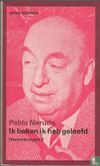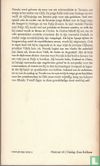Pablo Neruda
Born July 12, 1904
Died September 23, 1973
Country Chile
Genre (s) poetry
Pablo Neruda (Parral, July 12, 1904 - Santiago, September 23, 1973) is the pseudonym of the Chilean poet Neftalí Ricardo Reyes Basoalto (in full: Ricardo Eliecer Neftalí Reyes Basoalto).
He called himself Pablo Neruda after the Czech poet Jan Neruda (1834-1891), who he admired. Wanting to avoid a conflict with his parents would have played a role in this; they didn't want him to be a writer. Pablo Neruda later became his official name.
Neruda was born in Parral, a town about 300 kilometers south of Santiago, where his father worked in the railways. His mother died shortly after his birth. Not long after, Neruda and his father moved to Temuco, where his father married Doña Trinidad Candia Malverde.
At thirteen, Neruda sent some of his poems to the local newspaper, La Mañana. His first poem was called Entusiasmo y perseverancia (Enthusiasm and persistence). In 1920 he sent more poems to the literary magazine Selva Austral, under the pseudonym 'Pablo Neruda'.
His first collection of poems, La Canción de la fiesta, was published in 1920. In 1923 he published Crepusculario, and in 1924 he published Veinte poemas de amor y una canción desesperada (Twenty poems about love and a song about despair), one of his most famous works.
The diplomat Pablo Neruda was appointed Chilean consul in Spain, Madrid. In the meantime he was married on December 6, 1930 to the Indo-Dutch Maria Antonia Hagenaar, with whom he had a daughter in 1934. This child, Malva Marina, suffered from hydrocephaly, a malfunction in the drainage of the cerebrospinal fluid (hydrocephalus). At the outbreak of the Spanish Civil War in 1936, the couple split up (after temporarily fleeing to Monaco). Pablo Neruda remarried twice more, but Malva Marina remained his only child.
Gravestone of Malva Marina in a cemetery in Gouda Maria Hagenaar returned with her child to the Netherlands, where she placed it in the care of a nanny with a foster family in Gouda. The child died here on 2 March 1943 and was buried in the Vorstmanstraat cemetery, grave row M of section B, under the name Malva Marina Reijes. Neruda never paid any attention to his daughter, not even in his work. The mother, who lived in The Hague, regularly brought money to Gouda for the maintenance of the child.
The Dutch poet Hagar Peeters is working on a book about the 'forgotten' Dutch child of Neruda, which will be published in 2009.
A well-known work by Neruda is Canto General (1950), which has also been translated into Dutch. Canto General is an extensive work on North and Latin America. He wrote this as an exile while in hiding in 1948 and 1949, when he was persecuted by the government of Gabriel González Videla (1948-1952), who had banned the Communist Party for which Neruda had been elected as senator.
Neruda was awarded the Premio Nacional de Literatura de Chile in 1945. In 1971 he was awarded the Nobel Prize in Literature.
Neruda, who had long been hospitalized with cancer of the prostate, died there of a heart attack in 1973. His death occurred twelve days after the violent death of his friend Salvador Allende, Chile's elected Democratic president who was killed in a bloody anti-communist, military coup was killed on September 11, 1973. The national funeral of the poet, a public rally forbidden by General Pinochet's military rulers, became the first public protest against the new military dictatorship with the sudden appearance of thousands on Chilean streets.
Neruda's houses in Santiago (La Chascona), Valparaíso (La Sebastiana) and Isla Negra are now open to visitors. His works of art and possessions are exhibited there.
[
This text has been translated automatically from Dutch
Click here for the original text
Pablo Neruda
Geboren 12 juli 1904
Overleden 23 september 1973
Land Chili
Genre(s) poëzie
Pablo Neruda (Parral, 12 juli 1904 – Santiago, 23 september 1973) is het pseudoniem van de Chileense dichter Neftalí Ricardo Reyes Basoalto (volledig: Ricardo Eliecer Neftalí Reyes Basoalto).
Hij noemde zich Pablo Neruda naar de door hem bewonderde Tsjechische dichter Jan Neruda (1834-1891). Het willen voorkomen van een conflict met zijn ouders zou hierbij een rol gespeeld hebben; zij wilden niet dat hij schrijver zou worden. Pablo Neruda werd later zijn officiële naam.
Neruda is geboren in Parral, een stad ongeveer 300 kilometer ten zuiden van Santiago, waar zijn vader bij de spoorwegen werkte. Zijn moeder overleed kort na zijn geboorte. Niet lang daarna verhuisden Neruda en zijn vader naar Temuco, waar zijn vader trouwde met Doña Trinidad Candia Malverde.
Op zijn dertiende stuurde Neruda een aantal van zijn gedichten naar de lokale krant, La Mañana. Zijn eerste gedicht heette Entusiasmo y perseverancia (Enthousiasme en volharding). In 1920 stuurde hij meer gedichten naar het literaire blad Selva Austral, onder het pseudoniem 'Pablo Neruda'.
Zijn eerste gedichtenbundel, La Canción de la fiesta, werd gepubliceerd in 1920. In 1923 bracht hij Crepusculario uit, en in 1924 publiceerde hij Veinte poemas de amor y una canción desesperada (Twintig gedichten over liefde en een lied over wanhoop), een van zijn bekendste werken.
De diplomaat Pablo Neruda werd aangesteld als Chileens consul in Spanje, Madrid. Hij was inmiddels getrouwd op 6 december 1930 met de Indisch-Nederlandse Maria Antonia Hagenaar, met wie hij in 1934 een dochter kreeg. Dit kind, Malva Marina, leed aan hydrocefalie, een storing in de afvoer van het hersenvocht, (waterhoofd). Bij het uitbreken van de Spaanse burgeroorlog in 1936 ging het echtpaar uit elkaar (na tijdelijk te zijn gevlucht naar Monaco). Pablo Neruda hertrouwde nog twee keer, maar Malva Marina bleef zijn enig kind.
Grafsteen van Malva Marina op een begraafplaats in GoudaMaria Hagenaar ging met haar kind terug naar Nederland, waar zij het onder de hoede van een kindermeisje bij een pleeggezin in Gouda onderbracht. Hier is het kind op 2 maart 1943 gestorven en begraven op de begraafplaats Vorstmanstraat, graf rij M van vak B, onder de naam Malva Marina Reijes. Neruda heeft nooit enige aandacht voor zijn dochter gehad, ook niet in zijn werk. De moeder, die in Den Haag woonde, bracht regelmatig geld naar Gouda voor het onderhoud van het kind.
De Nederlandse dichteres Hagar Peeters werkt aan een boek over het 'vergeten' Nederlandse kind van Neruda, dat in 2009 zal worden gepubliceerd.
Een bekend werk van Neruda is Canto General (1950), dat ook in het Nederlands is vertaald. Canto General is een uitgebreid werk over Noord- en Latijns-Amerika. Hij schreef dit als banneling, terwijl hij zich verborgen hield in 1948 en 1949, toen hij vervolgd werd door de regering van Gabriel González Videla (1948-1952), die de Communistische Partij, waarvoor Neruda als senator gekozen was, had verboden.
Neruda kreeg in 1945 de Premio Nacional de Literatura de Chile. In 1971 werd hij onderscheiden met de Nobelprijs voor de Literatuur.
Neruda, die al langer in een ziekenhuis was opgenomen met kanker aan de prostaat, overleed daar aan een hartaanval in 1973. Zijn overlijden vond plaats twaalf dagen na de gewelddadige dood van zijn vriend Salvador Allende, de gekozen democratische president van Chili die bij een bloedige anti-communistische, militaire coup op 11 september 1973 om het leven kwam. De nationale begrafenis van de dichter, een openbare manifestatie die verboden was door de militaire machthebbers van generaal Pinochet, groeide door de plotselinge verschijning van duizenden in de Chileense straten uit tot de eerste publieke protestmanifestatie tegen de nieuwe militaire dictatuur.
Neruda's huizen in Santiago (La Chascona), Valparaíso (La Sebastiana) en Isla Negra zijn tegenwoordig opengesteld voor bezoekers. Zijn kunstwerken en bezittingen zijn er tentoongesteld.
[







